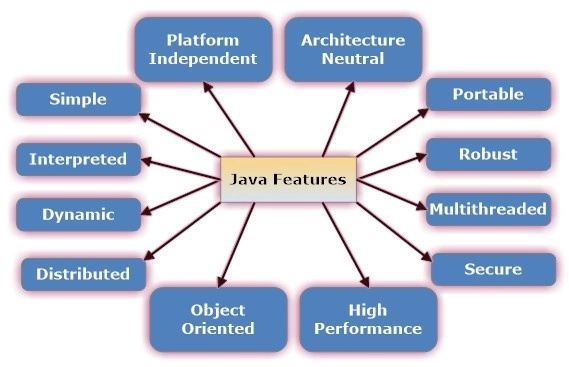Table of Contents

Introduction
Java is a popular and versatile programming language that has been widely used for web development for over two decades. Its robust features, extensive libraries and frameworks, and large community make it an excellent choice for developing high-quality, scalable web applications. In this blog, we will delve into the benefits of using this for web development and why it continues to be a popular choice among developers.
Robust Features and Capabilities
It is known for its robust features and capabilities, making it a suitable choice for developing a wide range of applications. It is an object-oriented programming language that supports features such as multithreading, automatic memory management, and garbage collection, which make it easier for developers to create high-quality, performant applications. It also provides a rich set of libraries and APIs, which makes it easier for developers to access a wide range of functionalities and services, such as network communication, data storage, and user interface design.
Scalable and Performant
Java is designed to be scalable and performant, making it ideal for developing large-scale web applications. Its automatic memory management and garbage collection features make it easier for developers to manage the memory usage of their applications, reducing the risk of memory leaks and improving overall performance. Additionally, It’s multithreading support allows developers to create applications that can handle multiple tasks simultaneously, providing a fast and responsive user experience.
Extensive Libraries and Frameworks
Java has a vast and extensive collection of libraries and frameworks that make it easier for developers to build high-quality, feature-rich web applications. From web development frameworks such as Spring and Struts to data storage libraries such as Hibernate and JPA, It provides a wide range of tools and services that make it easier for developers to build, test, and deploy their applications. This extensive ecosystem also provides developers with access to a wealth of resources and community support, making it easier for them to find solutions to common problems and improve their skills.
Widely Adopted and Supported
Java is widely adopted and supported, making it an excellent choice for developing web applications for a variety of contexts. The language is used by a wide range of industries, from finance to healthcare to gaming, and its popularity has continued to grow over the years. This widespread adoption has led to a large and active community of developers who contribute to its development and provide support to others who are learning the language. Additionally, It is supported by many development tools and platforms, including integrated development environments (IDEs), continuous integration and delivery (CI/CD) tools, and cloud services, making it easier for developers to create, test, and deploy their applications.
Ideal for Enterprise Applications
Java is a particularly good choice for developing enterprise applications, due to its robust features and scalability. It provides a range of features, such as security and reliability, that are essential for developing applications for enterprise systems. Additionally, It’s large and active community provides developers with access to a wealth of resources and support, making it easier for them to create high-quality applications that meet the needs of their organizations.
Java Benifits
Java is one of the world’s most popular programming languages, widely used for developing a wide range of applications, from desktop software to mobile apps to enterprise systems. Its popularity is due to its many benefits, including its robust features, extensive libraries and frameworks, and large and supportive community. In this blog, we will explore the benefits of using it and why it continues to be a popular choice for web development.
- Robust Features and Capabilities
Java is known for its robust features and capabilities, making it a suitable choice for developing a wide range of applications. It is an object-oriented programming language that supports features such as multithreading, automatic memory management, and garbage collection, which make it easier for developers to create high-quality, performant applications. It also provides a rich set of libraries and APIs, which makes it easier for developers to access a wide range of functionalities and services, such as network communication, data storage, and user interface design.
- Scalable and Performant
Java is designed to be scalable and performant, making it ideal for developing large-scale web applications. Its automatic memory management and garbage collection features make it easier for developers to manage the memory usage of their applications, reducing the risk of memory leaks and improving overall performance. Additionally, it’s multithreading support allows developers to create applications that can handle multiple tasks simultaneously, providing a fast and responsive user experience.
- Extensive Libraries and Frameworks
Java has a vast and extensive collection of libraries and frameworks that make it easier for developers to build high-quality, feature-rich web applications. From web development frameworks such as Spring and Struts to data storage libraries such as Hibernate and JPA, it provides a wide range of tools and services that make it easier for developers to build, test, and deploy their applications. This extensive ecosystem also provides developers with access to a wealth of resources and community support, making it easier for them to find solutions to common problems and improve their skills.
- Widely Adopted and Supported
Java is widely adopted and supported, making it an excellent choice for developing web applications for a variety of contexts. The language is used by a wide range of industries, from finance to healthcare to gaming, and its popularity has continued to grow over the years. This widespread adoption has led to a large and active community of developers who contribute to its development and provide support to others who are learning the language. Additionally, it is supported by many development tools and platforms, including integrated development environments (IDEs), continuous integration and delivery (CI/CD) tools, and cloud services, making it easier for developers to create, test, and deploy their applications.
History
Java is one of the world’s most widely used programming languages, and its popularity has only continued to grow over the years. But how did this powerful and versatile language come to be, and what has driven its success? In this blog, we will explore the history of this, from its humble beginnings to its current status as a leading programming language.
- Origins of Java
Java was first developed in the mid-1990s by James Gosling and a team of researchers at Sun Microsystems. The original goal of the project was to create a platform-independent language that could be used to write software for consumer electronics devices, such as televisions and VCRs. However, as the project progressed, the team realized that the language had much greater potential, and they decided to focus on developing a general-purpose programming language instead.
- The First Version of Java
The first version of Java was released in 1995, and it quickly gained attention for its unique features and capabilities. Java was designed to be a “write once, run anywhere” language, which meant that code written in Java could be run on any platform that had a Java Virtual Machine (JVM) installed. This was a major departure from traditional programming languages, which were often platform-specific and required developers to write separate versions of their code for each platform.
- Cross-Platform Compatibility
One of the key benefits of Java’s cross-platform compatibility was that it made it much easier for developers to write software that could be run on multiple platforms, such as Windows, MacOS, and Linux. This was especially important in the early days of the internet, when the number of different platforms and devices was growing rapidly. Java’s cross-platform compatibility allowed developers to write code that could be run on any platform with a JVM, making it a popular choice for web development and enterprise applications.
- Evolution of Java
Since its first release, Java has undergone many changes and improvements, and it continues to evolve to this day. New features and capabilities have been added, and the language has been optimized for performance and scalability. Additionally, It’s extensive libraries and frameworks have grown over the years, making it easier for developers to build high-quality, feature-rich applications.
- Java Today
Today, Java is one of the world’s most popular programming languages, widely used for developing a wide range of applications, from desktop software to mobile apps to enterprise systems. Its popularity is due to its many benefits, including its robust features, extensive libraries and frameworks, and large and supportive community. Additionally, this is supported by many development tools and platforms, making it easier for developers to create, test, and deploy their applications.
key features and capabilities of Java

In this blog, we will explore the key features and capabilities of it, and how they have helped make it one of the most versatile and powerful programming languages available.
- Cross-Platform Compatibility
One of the most important features of Java is its cross-platform compatibility. It’s code can be run on any platform that has a Java Virtual Machine (JVM) installed, which means that developers can write code once and run it on multiple platforms, such as Windows, MacOS, and Linux. This makes it much easier for developers to write software that can be used by a wide range of users, regardless of their platform.
- Object-Oriented
Java is an object-oriented programming language, which means that it is based on the idea of objects and classes. Objects are instances of classes, and they encapsulate data and behavior. Classes define the structure and behavior of objects, and they can be used to create new objects. The object-oriented paradigm is a powerful way of organizing code, and it makes it easier for developers to write clean, maintainable, and scalable code.
- Secure
Java is a secure programming language, and it was designed with security in mind from the very beginning. It provides a number of security features, such as automatic memory management and the Java Security Manager, which help to protect against common security threats, such as memory leaks and malicious code. Additionally, It’s extensive libraries and frameworks provide additional security features, such as encryption and authentication.
- Efficient
Java is an efficient programming language, and it has been optimized for performance and scalability. Java code is compiled into bytecode, which is then executed by the JVM. This means that Java code can be run on any platform with a JVM, and it can be optimized for that platform. Additionally, Java’s garbage collector helps to manage memory efficiently, freeing up resources for the program to use.
- Extensive Libraries and Frameworks
Java has a large and growing community of developers, and this community has created a wealth of libraries and frameworks that make it easier for developers to build high-quality, feature-rich applications. From popular libraries like Apache Struts and Spring, to frameworks like Hibernate and JPA, It has a rich ecosystem of tools and resources that help developers to build applications faster and more efficiently.
- Community
The Java community is large and growing, and it provides a wealth of resources and support for developers. Java has a vibrant online community, and developers can find answers to their questions and share their knowledge and experiences on forums, blogs, and other online resources. Additionally, Java has a growing number of conferences and events, where developers can meet and learn from each other.
Conclusion
Java is one of the most powerful programming languages in the world, which has been widely used for web development. It has been around for over two decades and has proven to be a robust and reliable language for developing high-performance web applications. With its ability to run on any platform and its ability to scale, Java has become the go-to language for large-scale web development projects.
The appeal of Java for web developers is due to its vast range of libraries, frameworks, and tools. These resources make Java a versatile language that can be used for a variety of purposes, including server-side web development, mobile app development, and even scientific and financial applications. Java is also an object-oriented language, which makes it easy for developers to write modular code that can be easily reused and modified.
One of the key benefits of Java for web development is its stability and reliability. Java has a strong type system and a garbage collector that automatically manages memory, which makes it more difficult for bugs to occur and for memory leaks to happen. Additionally, Java has a large and active community of developers who contribute to the development of new libraries and tools, which keeps the language up-to-date and relevant.
Java has a rich history of innovation, and it has continued to evolve over the years. In recent years, Java has undergone a number of changes, including the introduction of new features such as lambdas, streams, and the JavaFX framework. These new features have made Java even more powerful and versatile, and have helped to make it easier for developers to create high-performance web applications.
In conclusion, Java is a robust, powerful, and versatile programming language that has proven to be an excellent choice for web development. Its vast range of libraries, frameworks, and tools, as well as its stability and reliability, make it an ideal choice for developing high-performance web applications. Whether you are an experienced developer or just starting out, Java is an excellent language to learn and to use for web development projects. With its rich history of innovation and its continued evolution, Java is sure to remain a relevant and valuable tool for web developers for years to come.


